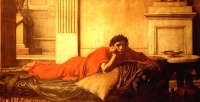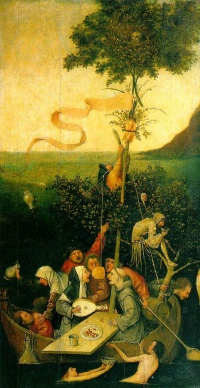Madness
From The Art and Popular Culture Encyclopedia
(Difference between revisions)
| Revision as of 17:47, 9 March 2009 Jahsonic (Talk | contribs) ← Previous diff |
Current revision Jahsonic (Talk | contribs) |
||
| Line 1: | Line 1: | ||
| - | [[Image:Painting showing opisthotonos in a patient suffering from tetanus by Sir Charles Bell.jpg|thumb|right|200px|Painting showing [[spasm]]s in a patient suffering from tetanus by Sir [[Charles Bell]] ([[1809]]).]] | + | [[Image:The Remorse of Nero by Waterhouse.jpg|left|thumb|200px|''[[The Remorse of the Emperor Nero after the Murder of his Mother]]'' (1878) by John William Waterhouse]] |
| + | {| class="toccolours" style="float: left; margin-left: 1em; margin-right: 2em; font-size: 85%; background:#c6dbf7; color:black; width:30em; max-width: 40%;" cellspacing="5" | ||
| + | | style="text-align: left;" | | ||
| + | "[[There is no great genius without some touch of madness]]" --Seneca, ''De Tranquillitate Animi'' | ||
| + | |} | ||
| + | [[Image:Portrait of a Kleptomaniac or Portrait of an Insane Person (French L'Aliéné or Le Kleptomane) is a 1822 oil painting by Théodore Géricault.jpg|thumb|right||200px|''[[Portrait of a Kleptomaniac]]'' (1822) by [[Théodore Géricault]]]] | ||
| + | [[Image:Ship of Fools by Jheronimus Bosch.jpg|thumb|right|200px|''[[Ship of Fools (painting)|Ship of Fools]]'' by [[Hieronymus Bosch]]]] | ||
| {{Template}} | {{Template}} | ||
| - | :''[[mental disorder]]'' | + | '''Madness''' is the state of being mad ([[insane]]) or [[angry]]. |
| + | |||
| + | ==Etymology== | ||
| + | Middle English ''medd, madd'', from Old English ''gemǣd'' (“enraged”), from ''gemād'' (“silly, mad”), from Proto-Germanic ''*maidaz'' (compare Old High German ''gimeit'' (“foolish, crazy”), Gothic ''gamaiþs'' (''gamaiþs'', “crippled”)), past participle of ''*maidijaną'' (“to cripple, injure”), from Proto-Indo-European ''*mei'' (“to change”) (compare Old Irish ''máel'' (“bald, dull”), Old Lithuanian ''ap-maitinti'' (“to wound”), Sanskrit ''मेथति'' (''méthati'', “he hurts, comes to blows”)). | ||
| == See also == | == See also == | ||
| + | *[[Amour fou]] | ||
| *[[Antisocial personality disorder]] | *[[Antisocial personality disorder]] | ||
| *[[Illness]] | *[[Illness]] | ||
| + | *[[Insanity]] | ||
| *[[Irrationality]] | *[[Irrationality]] | ||
| + | *[[Love is madness]] | ||
| *''[[Madness and Civilization]]'' | *''[[Madness and Civilization]]'' | ||
| + | *[[Mad emperors of Rome]] | ||
| + | *[[Madman]] | ||
| + | *[[Madwoman]] | ||
| + | *[[Mental disorder]] | ||
| *[[Obsession]] | *[[Obsession]] | ||
| - | *[[Unreason]] | ||
| *[[Psychopathy]] | *[[Psychopathy]] | ||
| + | *[[Stone of madness]] | ||
| + | *[[Unreason]] | ||
| + | == Music == | ||
| + | * [[Madness (band)]], a British ska/pop band | ||
| + | * "Madness", a song by Prince Buster from ''[[I Feel the Spirit]]'', also covered by Madness | ||
| + | |||
| {{GFDL}} | {{GFDL}} | ||
Current revision

The Remorse of the Emperor Nero after the Murder of his Mother (1878) by John William Waterhouse
|
"There is no great genius without some touch of madness" --Seneca, De Tranquillitate Animi |
|
Related e |
|
Featured: |
Madness is the state of being mad (insane) or angry.
[edit]
Etymology
Middle English medd, madd, from Old English gemǣd (“enraged”), from gemād (“silly, mad”), from Proto-Germanic *maidaz (compare Old High German gimeit (“foolish, crazy”), Gothic gamaiþs (gamaiþs, “crippled”)), past participle of *maidijaną (“to cripple, injure”), from Proto-Indo-European *mei (“to change”) (compare Old Irish máel (“bald, dull”), Old Lithuanian ap-maitinti (“to wound”), Sanskrit मेथति (méthati, “he hurts, comes to blows”)).
[edit]
See also
- Amour fou
- Antisocial personality disorder
- Illness
- Insanity
- Irrationality
- Love is madness
- Madness and Civilization
- Mad emperors of Rome
- Madman
- Madwoman
- Mental disorder
- Obsession
- Psychopathy
- Stone of madness
- Unreason
[edit]
Music
- Madness (band), a British ska/pop band
- "Madness", a song by Prince Buster from I Feel the Spirit, also covered by Madness
Unless indicated otherwise, the text in this article is either based on Wikipedia article "Madness" or another language Wikipedia page thereof used under the terms of the GNU Free Documentation License; or on research by Jahsonic and friends. See Art and Popular Culture's copyright notice.
_is_a_1822_oil_painting_by_Théodore_Géricault.jpg)


